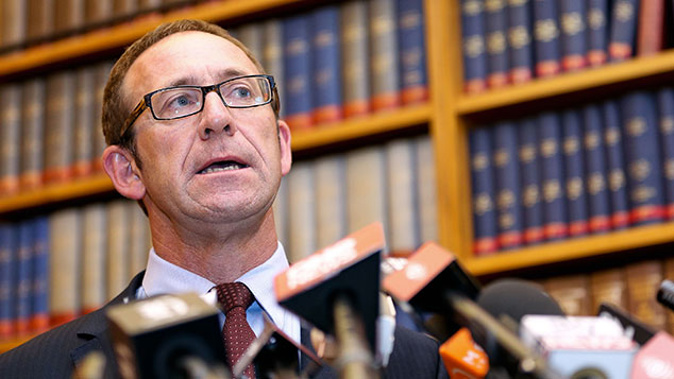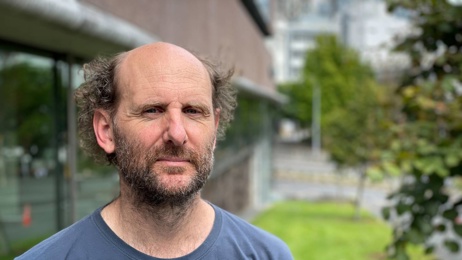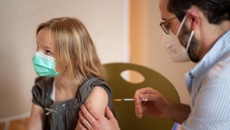
Up to 16,000 Covid cases a week around the country, most of them staying at home rather than managed isolation, and around 800 people in need of hospital care.
That's what the Covid situation and response might eventually look like - though these numbers are a worst-case scenario - as the country prepares to move to the traffic light system in two weeks, with travel in and out of Delta-hit Auckland to follow two weeks later.
Delta is now expected to spread all around the country - it's only a matter of time - with the consequences falling disproportionately on disadvantaged communities and the unvaccinated.
Health Minister Andrew Little said it's hard to know how it will play out given all the variables, including coming into summer, when 5- to 11-year-olds might get vaccinated, compliance with public health measures, and sheer luck.
But he adds that 800 hospital beds are less than 10 per cent of total hospital capacity.
"As it moves through the country, there'll be outbreaks, numbers will spike in one area but not in another, and then it'll reduce but spike somewhere else, or it might spike in multiple places," he told the Herald.
"That's why it's important each DHB and each group of DHBs on a regional basis are equipped to be geared up."
The 16,000 figure comes from taking the model for the region north of the Bombay Hills - 5400 cases a week at the upper end, based on 90 per cent of eligible people fully vaccinated - and tripling it for a whole-of-country estimate.
The optimistic scenario is for case numbers in the northern region stabilising at about 600 cases a week, fewer than in the current outbreak in Auckland, which might lead to 160 deaths a year.
This would translate nationwide to 1800 cases a week, 90 Covid patients needing hospital care in hospital, and 480 deaths - similar to the flu.
New response model stood up urgently
DHBs prepping for these scenarios had been happening, but became urgent with the Delta outbreak, with Little saying that the system in Auckland had underprepared by expecting about 120 to 150 home isolation cases a week.
Director general of health Ashley Bloomfield told the health select committee on Wednesday that the new model aimed to be "sustained and sustainable", where cases are managed and hospitals can go about their non-Covid business, but care for Covid patients as well.
The vast majority of cases will be managed at home, and with high vaccination levels, only 5 per cent or even less might need hospital level care.
The rapid shift to stand up home isolation for so many cases in Auckland led to some people falling through the cracks, Little said, including some cases not being notified quickly enough.
"The bottleneck that emerged - the Auckland experience with the public health unit being the first to be notified of a positive result, and then not having capacity to ring people in a timely enough way to let them know they had a result, and [then] going through the options of what sort of care they needed."
Fixing this means bringing in primary care quickly for a clinical assessment, he said.
"So people's GPs or a clinician are involved in that first day or so of being notified of a positive test, working out where is the best place to be - is it at home, the hospital, or another community facility?"
A social assessment follows to see what support they might need.
"The parts are all there, even to operate at scale. They've just got come together more comprehensively, so making sure the system is integrated and seamless and can respond very quickly."
Large scale home isolation for cases around the country will be a major challenge, he said; three cases isolating at home in Auckland recently died, including one who was coughing up blood.
"We need to make sure that the systems are in place so they get the care they need, the monitoring they need so if they do deteriorate, services kick in pretty swiftly to get them to where they need to be," Little said.
Questions have also been raised over whether a pulse oximeter should be given to every case at home, and Little conceded that young, healthy people aren't immune to their oxygen levels dropping rapidly.
But clinical advice was that not everyone needed them, he said, nor is one offered to every case in the home isolation systems in New South Wales and Ontario, Canada.
"Clinicians tell me that not everybody will need one because for some, particularly vaccinated people, symptoms will be mild to moderate.
"It's those with other health conditions or who are unvaccinated, their risk is much greater. And you want to have the pulse oximeters available for them."
Another issue is whether cases should be able to stay at home, even if it's risky because they might live in overcrowded housing, or with an immunocompromised person.
"It's about making sure that whatever choice is made, the best possible care in those circumstances is provided," Little said.
"But if you act against medical advice or clinical advice, then you're assuming that risk yourself."
In some circumstances, Little said a medical officer of health could compel a case to be taken into a hospital or isolation facility.
All hospitals need Covid beds and a regional plan
Little said each hospital would need dedicated spaces for Covid patients, managed in such a way that other patients aren't put at risk.
The level of available care is variable across the country, so Little said hospitals in a region, as well as each hospital, would need its own Covid management plan.
Lakes DHB, for example, has only six ICU beds, and only four of them are fully resourced.
"Hospitals are organising on a regional basis because - as is the case now, even without a pandemic - not every hospital provides all the hospital care that the population needs," Little said.
"If you've got cardiology problems and you live in Rotorua, you won't be going to Rotorua Hospital. You'll go to Waikato Hospital. Likewise, for the egregiously-affected Covid patients, they may not be cared for in their local provincial hospital. They may be transported somewhere else."
Little is visiting Auckland hospitals today and tomorrow to see how the systems are coping. He expected to release more details on health system preparations for Covid all over the country next week.
Fully staffed ICU beds still low
ICU capacity is also a concern, given New Zealand's per capita capacity is low compared to other OECD countries.
The Government has boosted the number of available ventilators, but staffing is the key issue.
Auckland City Hospital couldn't use one in five ICU beds at one point in the Delta outbreak because of a lack of staff, and extra health professionals had to be flown to Auckland from around the country.
The Government has been training non-specialist ICU nurses to work in ICU wards, but that isn't the same level of care as having a fully staffed and resourced ICU bed.
It takes years to train ICU nurses, though, so Little said training other nurses to help in ICU remained the focus.
"We can provide enough training for more nurses to work in that environment under supervision to provide the care that is needed for a Covid patient. That's what we're driving at at the moment."
Little has been challenged over ICU capacity by Capital and Coast District Health Board intensive care specialist Dr Paul Young over his assertion that 100 more ICU beds had been added nationally since the start of the pandemic.
"I challenge you to visit any ICU in the country and find one clinician (just one) who can show their newly staffed beds," Young wrote on Twitter.
Take your Radio, Podcasts and Music with you









